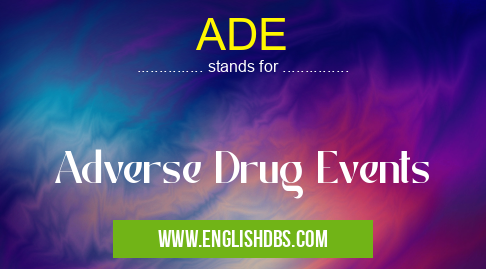What does ADE mean in DRUGS
Adverse Drug Events (ADE) is a term used to describe any form of serious, unanticipated harm that may occur with the use of a medication. This includes both adverse reactions to certain drugs and incorrect use or interactions between two medications. ADE's can range from mild side effects such as headaches and nausea, to more serious issues like organ failure, blood clots, or even death. In short, ADE’s are any unexpected potential health risks associated with taking medications.

ADE meaning in Drugs in Medical
ADE mostly used in an acronym Drugs in Category Medical that means Adverse Drug Events
Shorthand: ADE,
Full Form: Adverse Drug Events
For more information of "Adverse Drug Events", see the section below.
What does ADE Stand for?
ADE stands for Adverse Drug Events.
What does ADE Mean in Medical?
In medical terms, ADE stands for “adverse drug events” – any adverse reaction caused by the consumption of a medication. This includes both adverse reactions to certain drugs and incorrect use or interactions between two medications. Adverse drug events can include minor side effects such as headaches and nausea, up to more serious issues like organ failure, blood clots, or even death in extreme cases.
Essential Questions and Answers on Adverse Drug Events in "MEDICAL»DRUGS"
What is an Adverse Drug Event (ADE)?
An Adverse Drug Event (ADE) occurs when someone experiences a reaction to a medication that leads to negative health outcomes, or could have led to such consequences. ADEs can include anything from an allergic reaction to a medication, unexpected side effects from taking the drug, or overdose.
How common are ADEs?
ADEs are very common and potentially dangerous. It is estimated that between 6 and 10 percent of hospitalizations in the U.S. are related to adverse drug events. Additionally, roughly 1 in 5 emergency department visits in the U.S. are due to an ADE-related incident.
What causes an Adverse Drug Event?
Generally speaking, ADEs result from improper use of drugs including incorrect dosage amounts, incorrect dosing frequency, or interactions with other medications taken concurrently. Sometimes people experience an unexpected reaction due to their own unique biology and sensitivity levels which can also contribute to an ADE occurring.
Who is most at risk for experiencing an ADE?
Some demographic groups are more likely than others to experience an adverse drug event including those over the age 65, young children, pregnant women, and people with multiple chronic illnesses who may be taking multiple medications.
Are there certain drugs that pose a higher risk for causing serious ADEs?
Yes – certain drugs carry higher risks associated with them due to their potential side effects. For instance NSAIDs like ibuprofen have been associated with gastrointestinal issues such as ulcers while psychiatric drugs like benzodiazepines can promote addiction or even respiratory arrest if taken in excess amounts.
How can I stay safe while taking medications?
Taking any medication comes with some risks so it's important to be aware of these risks before starting a new medication and also during treatment as your body adjusts over time. Make sure you discuss your full medical history with your physician before beginning any new medications and follow their instructions closely regarding dosage amounts and frequency.
What should I do if I think I am having an adverse drug event?
If you suspect that you are having a negative reaction to any medication it is important not to stop taking it without consulting your physician first as this could worsen the situation depending on what kind of reaction you’re having. Contact your healthcare provider right away so they can assess the situation and take appropriate action if necessary.
What symptoms should I look out for when determining if I’m having an adverse drug event?
Some common signs of possible adverse drug events include abdominal pain or cramping, fatigue, dizziness or lightheadedness, fever or other flu-like symptoms, rash or hives on skin (especially face), itching/swelling (especially eyes/face/tongue), confusion/agitation/hallucinations, nausea/vomiting/diarrhea and difficulty breathing amongst other possible signs.
Final Words:
Adverse Drug Events (ADE) is an important concept in healthcare that encompasses any form of unexpected health risk related to taking medications. It is important for healthcare professionals as well as patients to be aware of the potential risks associated with taking medications so they can be prepared for potential side effects and plan accordingly. By understanding what an ADE is and being proactive about it, we can help ensure everyone's safety when it comes to taking medications.
ADE also stands for: |
|
| All stands for ADE |
